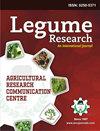生产制度影响下茴香-丛豆种植制度的长期试验:提高产量、品质和土壤肥力的策略
IF 0.8
4区 生物学
Q3 AGRONOMY
引用次数: 0
摘要
背景:为不断增长的人口生产足够的粮食的空前压力的增加导致在作物生产中使用大量农用化学品。为了克服这一问题,在种植系统中加入一年生脉冲作物,如集束豆(Cyamopsis tetragonoloba L.),是一种提高产量同时将环境影响降至最低的替代技术。因此,为了评估不同作物生产制度对茴香-四角豆作物序列产量、品质和土壤肥力属性的影响,进行了长期大田试验。方法:在AI-NPOF项目下,于2016- 2017年至2020- 2021年在印度拉贾斯坦邦的icar国家种子香料研究中心对茴香(Foeniculum vulgare L.)集束豆(Cyamopsis tetragonoloba L.)作物序列进行田间试验。试验采用随机完全区(RCBD)的析因设计,有3个重复。第一个因素包括六个生产系统,即(PS1) -100%有机,(PS2) - 75%有机+ 25%创新实践(堆肥提取物,牛尿),(PS3) -综合(50%有机+ 50%无机),(PS4) -综合(75%有机+ 25%无机),(PS5) -100%无机营养源和(PS6) -国家推荐],包括茴香(Rabi季节)-集束豆(Kharif季节)种植序列,而第二个因素包括该时期的环境。结果:研究结果表明,集束豆(1501.87 kg ha-1)和茴香(1970.19 kg ha-1)以PS4 -一体化生产体系(75%有机+ 25%无机)的种子产量和产量属性最高。研究表明,在茴香和豆荚中,与PS5和PS1相比,生产体系PS4的蛋白质含量分别增加了17.29%和30.75%。在生产系统PS1下,土壤有机碳(~25.2%)和速效氮(~9%)、磷(~38.5%)和钾(~无显著性)的年增量分别比生产系统PS5增加了1%。茴香与集束豆籽粒产量、土壤有机碳、Shannon-Wiener指数分别呈显著正相关(P < 0.01)和显著正相关(R2 = 0.75、R2 = 0.69)。产量、质量、土壤有机碳和土壤可持续性综合评价表明,豆科作物轮作效果较好,为作物可持续集约化提供了模式。因此,在以茴香为主的农业生态系统中,在种植系统中添加豆科作物并实施综合营养管理(INM)可逐步改善土壤质量。本文章由计算机程序翻译,如有差异,请以英文原文为准。
Long-term Experiment on Fennel-cluster Bean Cropping System as Affected by Production Systems: A Strategy for Improving Yield, Quality and Soil Fertility
Background: The rise in unprecedented pressure of producing enough food for an ever-growing human population resulted in the use of considerable amounts of agrochemicals in crop production. To overcome this, inclusion of annual pulse crops such as cluster beans (Cyamopsis tetragonoloba L.) in cropping systems is an alternative technique for enhancing output while minimising environmental impact. Therefore, to assess the influence of different crop production systems on yield, quality and soil fertility attributes of fennel (Foeniculum vulgare L.)-cluster bean (Cyamopsis tetragonoloba L.) crop sequence, a long term field experiment was conducted. Methods: A field experiment was conducted on fennel (Foeniculum vulgare L.) cluster bean (Cyamopsis tetragonoloba L.) crop sequence under AI-NPOF Project during 2016-17 to 2020-21 at ICAR-National Research Centre on Seed Spices, Ajmer (Rajasthan), India. The experiment was laid out as a factorial design based on randomized complete blocks (RCBD) with three replications. The first factor consisted of six production systems viz., (PS1) - 100% organic, (PS2) - 75% organic + 25% innovative practice (Compost extract, cattle urine), (PS3) - Integrated (50% organic + 50% inorganic), (PS4) - Integrated (75% organic + 25% inorganic), (PS5) -100% inorganic nutrient sources and (PS6) - State recommendation] including fennel (Rabi season) - cluster bean (Kharif season) cropping sequence, whereas the second factor included the environment over the period. Result: The outcomes of study revealed that production system (PS4) - Integrated (75% organic + 25% inorganic) resulted in the maximum seed yields and yield attributes of cluster bean (1501.87 kg ha-1) and fennel (1970.19 kg ha-1). The study shows that the production system (PS4) had a 17.29 and 30.75% increment of protein as compared to PS5 and PS1 in fennel and cluster beans, respectively. Under production system PS1, the per cent increment of soil organic carbon (~25.2%) and readily available N (~9%), P (~38.5%) and K (~Non-significant) were noted over the years respectively, compared with production system (PS5). A significant positive association was observed between fennel and cluster bean grain yield and soil organic carbon (P less than 0.01) and the Shannon-Wiener indexes (R2 = 0.75, R2 = 0.69), respectively. The combined assessment of yield, quality, soil organic carbon and soil sustainability shows that rotations based on legume crops performed better and provided a model of sustainable crop intensification. Thus, adding legume to the cropping system and implementing integrated nutrient management (INM) could gradually improve soil quality in agro-ecologies where fennel predominates.
求助全文
通过发布文献求助,成功后即可免费获取论文全文。
去求助
来源期刊

Legume Research
AGRONOMY-
CiteScore
1.30
自引率
37.50%
发文量
256
审稿时长
6-12 weeks
期刊介绍:
Legume Research An International Journal. The Journal is an official publication of Agricultural Research Communication Centre. It is designed to bring out the original research articles on genetics, breeding, physiology, bacterial avtivity, production, quality, biochemistry and seeds of legumes crops. The objective of the journal is to serve as a forum for scientific community to publish their research findings on legumes ans to provide basis for new research. Journal is being scanned in the important indexing and abstracting services.
 求助内容:
求助内容: 应助结果提醒方式:
应助结果提醒方式:


